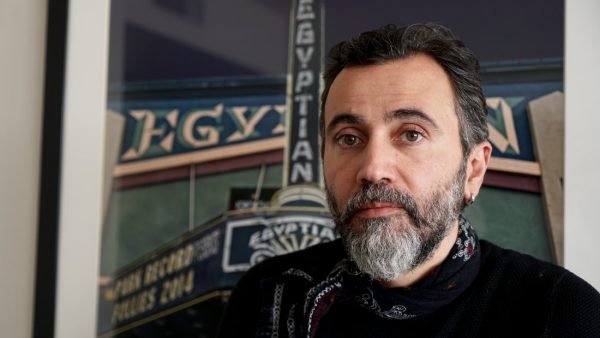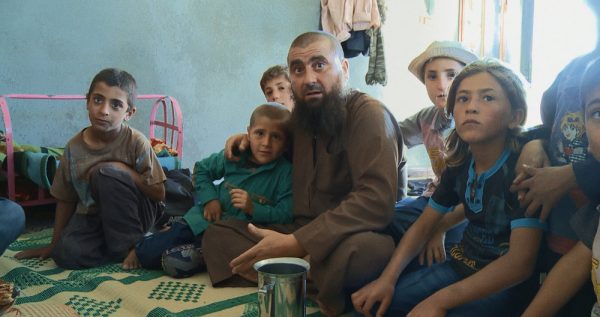Film Interview: Syrian Filmmaker Talal Derki on his Oscar-Nominated Documentary — Separating Delusions from Mythology
By Neil Giordano
Syrian-Kurdish filmmaker Talal Derki on love and hate in his homeland and the “schizophrenia” of being an Oscar nominee.

Filmmaker Talal Derki. Photo: Matthew Carey.
Filmmaker Talal Derki, along with many of his compatriots fleeing the civil war in Syria, currently lives in exile in Berlin. His first film, Return to Homs was a Sundance Grand Jury winner in 2013. It follows the story of a young Syrian soccer star who became a leading voice in the rebellion against the Assad government. After he takes up arms with his fellow rebels, they fight a fruitless campaign to break the siege on the city of Homs, a struggle that ultimately leads him toward a jihadist ideology.
Derki’s latest documentary, Of Fathers and Sons, focuses on the Syrian conflict again, this time from the side of an Al-Qaeda jihadist, Abu Osama. He raises his preteen sons, Osama and Ayman, to fight for Islamist ideals. Derki embedded himself with the family for two years, claiming to sympathize with their militancy in order to capture the honest and terrifying truths of their views on his homeland. The film has garnered numerous accolades and received an Oscar nomination for Best Documentary Feature.
Due to the Trump Administration’s draconian policies, however, Derki was initially denied entry to the United States this year to attend the awards ceremonies. Late last month, after a wave of support from fellow filmmakers and artists, the U.S. Embassy in Berlin granted the visa.
I talked with Derki this week from his hotel in Los Angeles as he prepared for the Oscar ceremony and the Independent Spirit Awards, where Of Fathers and Sons is also nominated for Best Documentary.
Of Fathers and Sons is screening at The Brattle Theater on March 11, part of the DocYard Series.
Arts Fuse: First of all, congratulations on the Oscar nomination, which I know is very complicated given what’s happened in the last couple of months.
Talal Derki: Thank you so much. Yes, making this film, this kind of film, the conditions of the shooting, the concept, and then being in the Oscars competition, it’s a kind of schizophrenia, a paradox in a way. But, at the end of the day, this film, with the team that we are, the way it’s been built, it’s very important for us, this nomination. It helps create more global interest and chances for [distribution]. And I think the film is difficult — the feel of the story and the drama, the huge emotional difference between hating and loving. Viewers are not used to this kind of treatment and concept. So it’s tricky: you don’t know how people watching the film will react.
AF: Yes, even some critics misunderstood the film’s intentions. The New York Times, for instance, seemed to accuse you of “complicity” by simply shadowing the jihadists, although I’m not quite sure what they expected you to do as a filmmaker.
Derki: Yeah, that review was a little bit unclear. Like, what do you want me to do? To take the gun from Abu Osama in his territory? We’re making a film. I called myself a “sympathizer” [in order to get access] and I declare this in the film from the very beginning. I was very clear with my audience that I had to play the role of a sympathizer and admirer. I had to become very close to the family members, to understand them more. You need them to love you, not to love you, really, but to be comfortable with you. This society is the most closed society ever, if you are a little bit different, you are not welcome.
AF: I could see the closedness in the society, between the men themselves. And especially the women and the girls, who are barely seen at all on screen, and are even threatened with violence by the men and boys for simply showing up in the frame. Still, there’s an openness between Abu Osama and his sons. What I thought was remarkable is that you made him strikingly human without making his politics sympathetic. You managed to get him to speak to you as if you were a relative, or at least a comrade. Did he trust you because he thought it would get his message out, that he thought the film could be used for recruiting? Or was it something more personal that got him to show you both the jihadist tactician side of him and the family man?
Derki: Osama himself was disappointed when he learned [later] that I’m not a religious guy. Because he was teaching me a lot of his methods, as [if I was] a beginner who had just discovered that he’s supposed to belong, and that he’s supposed to believe as jihadists believe. He was teaching me things because I really wanted to understand. It’s the way you make any documentary. You go with all the questions you have in your head, and you want to find answers. If you do not find the answers, you at least find some understanding or a deeper perspective on the human experience.
With Osama, I did not criticize him. I just showed his two faces, that he’s a lovely father, that this is something very natural, that fathers throughout all of creation love their children. At the same time, you see him love his ideology, love killing people, and he wants his kids to be fighters, and they are still kids, and he wants to sacrifice them to the cause.
So I tried to present the mythological lies he talks about, the religion mixed with the ideology, and to show how it is a paradox. He talks about [the biblical] Abraham, and says ‘Thank God we don’t sacrifice our kids,’ and at same time he sends his own kids to their death on the front line.
AF: Yes, I thought that the allusion by him to Abraham and Isaac was one of the most horrible ironies in the film.
Derki: Not everyone notices this scene. He goes on about how Armageddon is coming, the fulfillment of prophecies made a thousand years ago. These [religious] stories are even written in old-fashioned ways — not like Game of Thrones, not like Lord of the Rings, all these big battles. It’s a bad story, it’s just symbolic and not real. He believes that it will happen, that he will raise the flag, that somebody will rise in the crusade, and the Muslims will conquer. People are living in a mythology from a thousand years ago.

A scene from “Of Fathers and Sons.” Photo: Kino Lorber
AF: Can they see the difference between mythology and delusion?
Derki: Yes, delusions, but I use the word “mythology” because they say that the Prophet Muhammad said this and demanded that. It’s a religion for them in the end of the day.
AF: A question about the filmmaking process. I’m most interested in the editing. Since you were there for two years, how did you shape the footage into something that resembled a story?
Derki: We worked hard to get at the soul of this story. It was quite difficult. We edited it into a six-hour film, and then reduced it, and reduced it again. A lot of beautiful moments were cut. But we decided not to use scenes in which the main character’s family didn’t appear.
As a filmmaker, from the beginning of the shooting, it was clear that I was going to focus on the psychological journey of [the son] Osama from child to jihadist. The brainwashing process. I wanted to juxtapose the scenes of Abu Osama cuddling with his kids with Osama in the training camp. It’s all about this paradox of black and white, of hate and love.
As an viewer, you might becomes confused — a scene reminds you of your father, or reminds you of yourself as a father. You should look at Osama as human, as a human who has lost his direction. The son is supposed to care about religion, not to break with his beliefs or lie to his father. So he ends up a jihadist, because it was his opportunity in life; this is the only option he finds. It’s all connected, it’s all circles, you cannot survive outside of the circle of violence you build around yourself. It’s about the legacy that goes from generation to generation.
AF: At the end of Of Fathers and Sons there’s a short narration, and you say something like, ‘I’m finally going to leave this nightmare.’ I’ve seen several films in the past few years on the Syrian civil war, and each is more gruesome than the last. Do you have hope that there’s an end to the nightmare? Do you see an end to the conflict? It seems like no one wants it to end.
Derki: No, I don’t have hope. When one crime goes by without judgment, then a thousand crimes follow, and it is hard to find a solution outside of the darkness. There is no political solutions at the moment; the dictatorship is still in place and the country is divided.
What I hope is that what has happened to Syria will not happen elsewhere. For societies to make sure that an acceptance of violence is not part of childhood. To maintain a healthy society that protects children’s and women’s rights, that gives kids a better chance to live, to communicate, not to teach religion in the school, to establish laws for protecting kids in their schools and their houses. This is my message if there is a message. I don’t want people to end up like these kids.
Neil Giordano teaches film and creative writing in Newton. His work as an editor, writer, and photographer has appeared in Harper’s, Newsday, Literal Mind, and other publications. Giordano previously was on the original editorial staff of DoubleTake magazine and taught at the Center for Documentary Studies at Duke University.
Tagged: Neil Giordano, Of Fathers and Sons, Syria, Syrian Refugees, documentary
